Alumni Books
Spring 2023
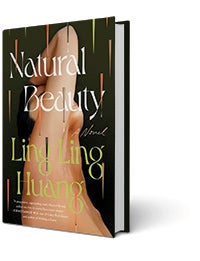
Natural Beauty
Ling Ling Huang ’14
Penguin Random House, 2023
In Ling Ling Huang’s surreal and darkly humorous debut novel, “Natural Beauty,” the unnamed narrator abandons her budding career as a virtuoso pianist when her beloved immigrant parents are badly injured in an accident. To pay for their care, she takes a job at a high-end natural beauty and wellness store and there finds herself pulled into an increasingly horrific world that challenges her sense of agency and identity and gradually decays the well-being of herself and everyone around her. Huang is also a real-life virtuoso musician — although with the violin — whose parents immigrated to escape the Cultural Revolution in China. We spoke to Huang about the relationships between music and writing, writer and narrator, and beauty and authenticity.
What is the relationship between music and writing for you?
I don’t think I could do one without the other. I started writing short stories and poems to go with music for program notes. I found that came really easily because I always am visualizing things and seeing things in my mind when I’m playing. And then, when I’m writing, similarly, I love listening to classical music. So I do them in tandem, and I think they enrich each other. It’s an act of, almost, translation between the two.
What made you decide to satirize beauty and wellness?
After my time at Rice, I moved to New York, and before I could plug into the freelancing scene for music to make ends meet, I was working at a natural beauty and wellness store. I was selling $400 water filters to board members of the Whitney Museum of American Art and actresses and politicians. My first day, they gave me a gigantic golden spoon to dig out organic stone-ground coconut butter, and I was like, this is just a totally different world from anything I had ever been doing.
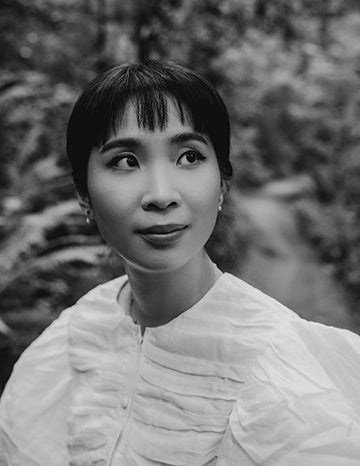
Some readers have described the book as surreal or dreamlike. Did you set out to write it that way?
I didn’t have a set kind of tone or idea, but I think it represents a lot of the natural beauty industry itself, where they’re using the most cutting-edge biotechnology and they’re putting all of this NASA-backed research into changing on a cellular level — but for the most “natural” look, or for you to “be yourself.” It’s a really strange and surreal industry, and I think it’s natural to write a book that ended up reflecting those qualities.
If people could take away one message or one idea from the book, what would you want it to be?
Treasure yourself and understand that every part of you comes from somewhere. There’s ancestry, lineage, heritage, and all of that is more beautiful than any trend or any new TikTok beauty method. Don’t betray yourself. And don’t think that you don’t have anything to lose when you’re trying to become someone else or become your “best self.”
Although she adopts an American-sounding name toward the end, the narrator’s real name is never given. What was the reason for that?
I grew up in an area where it was primarily white; until the second grade, I think, most of my community friends and schoolmates were white. I wasn’t nameless, but I’ve often felt kind of identity-less, because I know that projections do a lot of work, and it feels difficult to engage with that: to prove them wrong would take energy and alter myself. So when I think of my childhood — a lot of it, I felt like I was just blank. So I made my narrator blank.
The main character behind your fictional Holistik empire is a man who thinks that he’s rescuing women by making them more beautiful. But then the other people who are complicit in his horrific plots are women. To what degree were you wanting to talk about misogyny and internalized misogyny in the beauty industry?
I think that was very intentional. I’ve always been surprised that a lot of the CEOs of major beauty companies are male. We’re probably incapable of seeing things through something that’s not the male gaze. I always wonder how much I can really see through my own eyes, not through a Eurocentric lens or the male gaze. But also, most people think they’re doing the right thing. We want to do what’s best for us, and that explains a lot of the complicity, but hopefully, the book shows compassion for everyone. I mean, I’m sure it’s clear that I have opinions on what they’re doing, but if I could show that they all have reasons that can make sense for what they’re doing, that’s what I hope to do.
How do your parents feel about your writing?
When my agents and I sold the book, definitely fewer than 10 people in my life knew that I had even written one. And that was protective, in case it was a total failure. It was definitely such a shock to my parents and my family, because they had no idea that I was writing. They’re so happy. They’re thrilled. It’s probably been hard for them, because writing just looks like you’re doing nothing in a room by yourself. During breaks during the pandemic, I was with them for a while, and I’m sure they were just like, she just sits on her computer all day. Like, doing nothing.
— Interview by Hilary C. Ritz
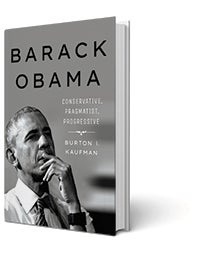
Barack Obama
Conservative, Pragmatist, Progressive
By Burton I. Kaufman ’64, ’66
Cornell University Press, 2022
Both supporters and detractors of Barack Obama expected radical reform from his presidency. But even Obama’s most groundbreaking policy achievement, the Affordable Care Act, was more conservative than radical, argues Burton I. Kaufman.
In “Barack Obama: Conservative, Pragmatist, Progressive,” Kaufman, professor emeritus of history and dean emeritus of the School of Interdisciplinary Studies at Miami University of Ohio, examines the differences between perceptions and the reality of Obama’s presidency, concluding that ultimately, Obama was an economic conservative and a political pragmatist. “His conservativism explains why he became so criticized both by Democrats on his political left and Republicans on his political right and accounts in part for the congressional deadlock that he encountered throughout much of his administration,” Kaufman writes. Even as the Obama administration maintained the nation’s existing free enterprise system, however, Obama’s efforts to expand opportunities for marginalized groups set him apart from past presidents. Kaufman concludes that future historians will consider him one of America’s best post-World War II presidents, along with Harry S. Truman and Dwight D. Eisenhower. — Jennifer Latson
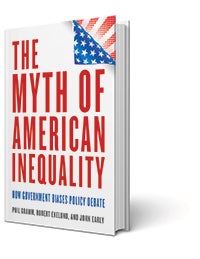
The Myth of American Inequality
How Government Biases Policy Debate
Phil Gramm, Robert Ekelund and John Early ’66
Rowman and Littlefield, 2022
In a 2020 article, The Economist asserted, “It is a truth universally acknowledged that inequality in the rich world is high and rising.” That assertion was grounded in worrying statistics from the U.S. Census Bureau and the Bureau of Labor Statistics, which indicate that income inequality has grown steadily since World War II. But those statistics are wrong, say the authors of “The Myth of American Inequality.”
The book’s authors — former Texas Senator Phil Gramm, economist Robert Ekelund and John Early, a former assistant commissioner at the Bureau of Labor Statistics — paint a much rosier picture of American economic well-being, arguing that income inequality is, in fact, lower now than at any point in the past 75 years. They posit that the Census Bureau has substantially understated the income of low-income Americans; using their own analysis of the data, they conclude that income inequality is only a quarter of the official census measure. “The resulting picture shows a very different and better America than the one that is currently portrayed in the official statistics of the nation and described by advocates across much of the political spectrum,” they write. “In postwar America, we have experienced strong and widely shared prosperity.” — J.L.
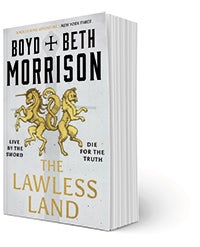
The Lawless Land
Beth Morrison and Boyd Morrison ’89
Head of Zeus, 2022
A few years back, Boyd Morrison was already the bestselling author of a dozen thrillers, six written in collaboration with the late Clive Cussler, underwater explorer and adventure writer extraordinaire. Boyd’s sister, Beth Morrison, an expert medievalist with a Ph.D. from Cornell and the senior curator of manuscripts at the J. Paul Getty Museum, was an avid reader of her brother’s books. So when Boyd asked Beth if she would be his next collaborator, setting a series in the Middle Ages she’d spent decades mastering, she called it “a dream come true.”
Their new novel, “The Lawless Land,” is an action-adventure romp that effectively meshes Boyd’s narrative skills with Beth’s attention to historical detail. Protagonist Gerard Fox is an English knight errant determined to clear his family’s name after a corrupt cardinal destroyed it to cheat them of their land. But Fox is swept off track by a beautiful lady fleeing with a secret she’s protecting with her life and which the very same cardinal would do anything to discover. The twists-and-turns chase covers plenty of (literal and figurative) territory, from tavern brawls and passages by ship to skirmishes at convents and castle tournaments, and it is pleasingly fast paced for a doorstop tome. — H.R.
